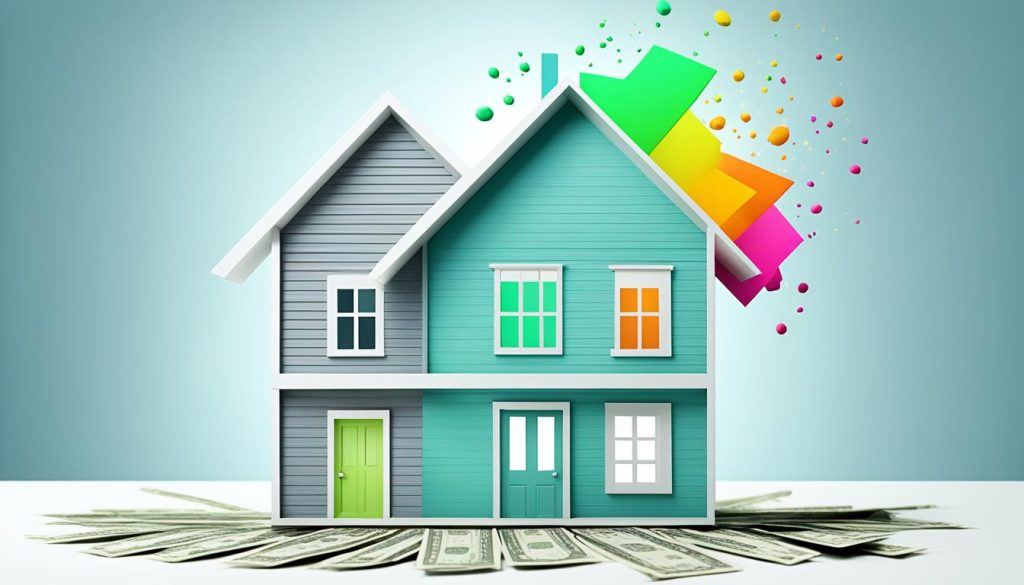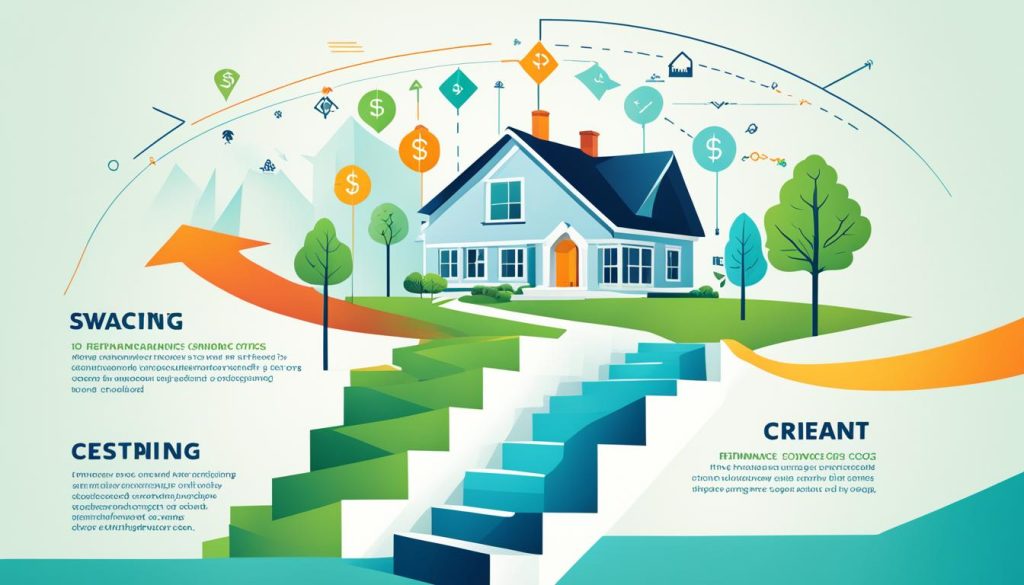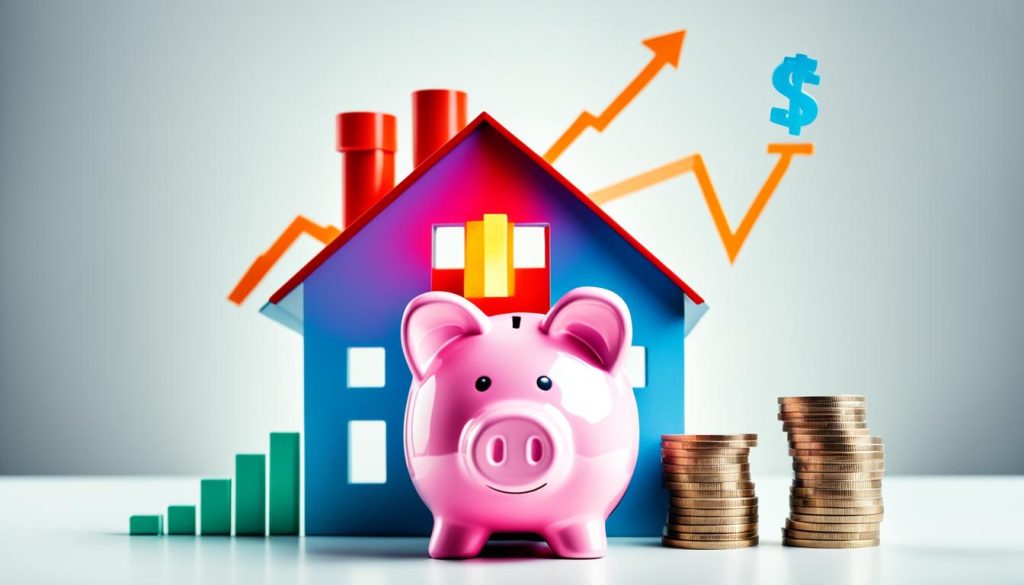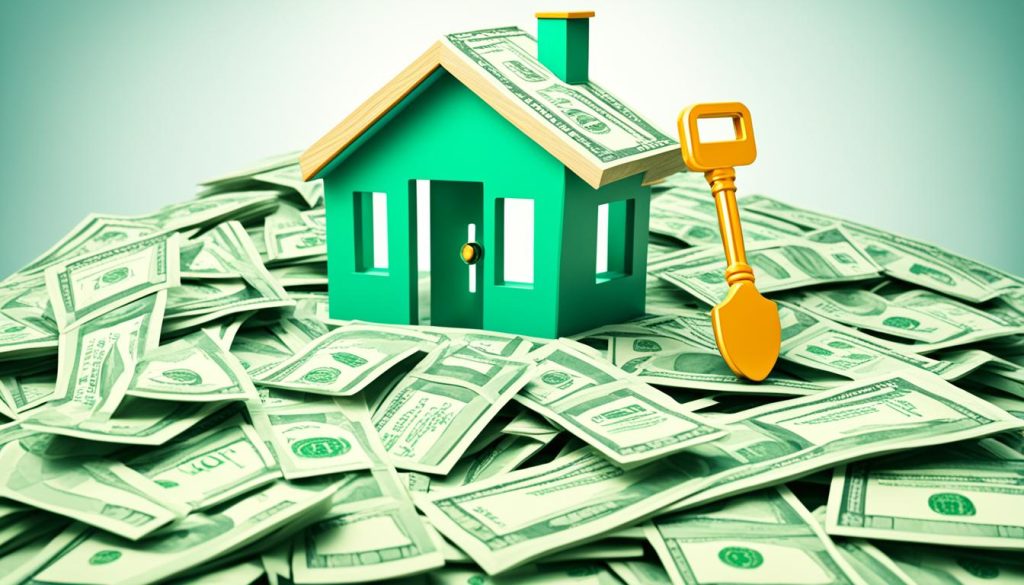In recent years, home values have soared, making more Americans ‘equity rich’1. This means they have a lot of value in their homes. Refinancing your mortgage can be a smart way to use this equity and boost your finances. It can help you pay off high-interest debt, increase your cash flow, or get funds for other needs.
Refinancing comes with many benefits that can improve your financial health. It’s a chance to make your money work better for you.
Key Takeaways
- Refinancing can give you access to the equity in your home, which is the value above your mortgage balance1.
- It can lead to lower monthly payments by getting a lower interest rate, changing the loan term, or removing private mortgage insurance (PMI)12.,
- You can use the cash from a cash-out refinance for things like home improvements or paying off debt2.
- Refinancing lets you switch loan types, like going from an adjustable-rate to a fixed-rate mortgage1.
- It can offer tax benefits for investment properties by making the interest on the loan tax-deductible3.
What is Refinancing?
Refinancing means swapping an old loan for a new one with better terms, like lower interest rates or easier repayment options4. It’s often done with mortgages, where homeowners get a new loan to replace the old one.
Definition and Overview
When you refinance, you pay off the old debt with a new loan4. This can lead to lower interest rates, smaller monthly payments, or a change in loan terms4. Expect to pay 2% to 5% of the loan’s amount in closing costs4. The whole process usually takes about 30 to 45 days4.
To get a conventional refinance, you need a credit score of 620 or higher4. If you have 20% equity in your home, you’ll likely get better rates and fewer fees4. Some lenders offer a no-closing-cost refinance, adding costs to the loan for a higher monthly payment and interest rate4.
For those struggling with mortgage payments, lenders might offer a short refinance4. This can lower the loan amount, forgiving the difference. Refinancing can help improve your finances by paying off your mortgage faster, reducing payments, or using home equity for other needs56.
“Refinancing can be a powerful financial tool, allowing homeowners to take advantage of lower interest rates, reduce monthly payments, or tap into their home’s equity for other needs.”
| Refinancing Scenario | Before Refinancing | After Refinancing |
|---|---|---|
| Mortgage Interest Rate | 8% | 4% |
| Monthly Payment | $1,500 | $1,200 |
| Total Interest Paid Over 30 Years | $540,000 | $432,000 |
Refinancing from an 8% to a 4% interest rate can save you money each month and cut down on long-term interest costs6. Think carefully about refinancing, considering the benefits and drawbacks, like the break-even point and closing costs564.
Reasons to Consider Refinancing Your Home Loan
Refinancing your home loan can bring many benefits. You can lower your interest rates and monthly payments. It also lets you use your home’s equity or consolidate high-interest debt. If you want to save money, change your loan terms, or get funds for other needs, refinancing could be a smart move7.
Lower Interest Rates and Monthly Payments
Many homeowners refinance to get a lower interest rate on their mortgage. Lenders say a 1% to 2% drop in interest rate is enough to refinance7. For instance, a $100,000, 30-year mortgage at 7% costs $665 a month. At 5%, it drops to $5367. This can save you a lot over the loan’s life and lower your monthly costs, giving you more money for other goals.
Cash-out Equity for Other Purposes
Refinancing lets you use your home’s equity for other expenses, like home improvements or investments8. The cash from refinancing isn’t taxed by the IRS7. This is great for homeowners who want to use their equity without a separate loan or line of credit.
Change Loan Terms or Mortgage Type
Refinancing can change your loan terms, like making payments smaller or paying off the mortgage quicker8. Some switch from adjustable-rate to fixed-rate mortgages or from government to conventional loans8.
Consolidate High-interest Debt
Refinancing can help consolidate high-interest debts into one, lower-interest loan8. This can save you money on interest and make managing your money easier.

Deciding to refinance should be based on your financial goals and situation. Think about the benefits and costs to see if it’s right for you8.
Benefits of Refinancing
Refinancing your home loan can open up many advantages for smart homeowners. One big plus is getting a lower interest rate. This can help you save a lot of money on interest over time9.
Another great thing about refinancing is it lets you lower your monthly mortgage payments. With a lower interest rate or a changed loan term, you can have more money each month. This gives you more freedom and peace of mind9.
Refinancing also lets you use your home’s equity for things like fixing up your home, paying off debt, or reaching other financial goals. But, remember, most banks only let you borrow up to 70% of your home’s value for cash-out refinancing10.
If you’ve been paying private mortgage insurance (PMI) because you put down a small amount, refinancing can help you stop paying it. This happens when you build up enough equity in your home11. Getting rid of PMI depends on your payment history, loan type, how much equity you have, and what your lender says11.
Finally, refinancing lets you change how long your loan lasts. You can pick a longer term for smaller monthly payments or a shorter term to pay off your mortgage faster. This way, you can match your loan to your financial plans and life changes9.
“Refinancing can be a powerful tool for homeowners, providing the opportunity to save money, access equity, and better align their mortgage with their current financial situation.”
Whether you want to lower your interest rates, cut your monthly payments, use your home’s equity, stop paying PMI, or change your loan term, refinancing has many benefits. These can greatly improve your financial health10119.
The Refinancing Process
Starting the refinancing journey has several key steps. First, you’ll need to submit a loan application to your lender12. This application will ask for your two most recent pay stubs, W-2s, and bank statements12. Then, the lender will order a property appraisal to find out your home’s current value12.
After the appraisal, the lender will check your credit, income, and finances for loan approval13. Closing on a refinanced loan is usually quicker than buying a home, making it easier12.
Refinancing has closing costs like application fees and lender fees14. These costs should be thought about when deciding to refinance, as they affect savings and when you’ll break even13. Luckily, many lenders now offer a digital refinancing process, making it easier to apply and get approved12.
| Refinancing Step | Timeline |
|---|---|
| Rate Lock Period | 15 to 60 days12 |
| Application to Closing | Approximately 48 days13 |
| Closing Costs | 1% or more of the new loan amount14 |
Understanding the refinancing process helps you decide if it’s right for you13. With good planning and attention to details, you can benefit from refinancing and save thousands over your loan’s life14.

Factors to Consider Before Refinancing
Refinancing your home loan can be a smart move, but think it over carefully. Your credit score and financial health are key in getting the best loan terms and rates15. Lenders like to see a credit score of 750 or higher for the best rates. Some government programs accept scores as low as 580 or don’t have a minimum15.
Think about the break-even point too, which is when you pay back the refinance costs15. In 2021, the average cost to refinance a home was $3,860. Costs usually range from 2% to 6% of the loan amount15. Make sure the long-term gains are worth the upfront costs.
Credit Score and Financial Situation
Your credit score and financial health are vital for getting good loan terms and rates when refinancing15. Lenders look at your credit history, debt-to-income ratio, and more to see if you’re a good borrower15. You usually need a credit score of 620 or higher for conventional mortgage refinancing15.
Break-even Point and Closing Costs
Figuring out the break-even point is key, which is when you pay back the refinance costs15. Refinancing can cost 3% to 6% of the loan amount. You can lower costs by rolling them into the loan or negotiating with lenders15. Make sure the long-term gains are more than the upfront costs.
Future Plans and Loan Terms
Think about your future plans and how the new loan fits with them16. Do you want lower monthly payments, a shorter loan, or to use your home equity? Talking to a mortgage expert can help you decide if refinancing is right for you16.
Refinancing can boost your finances, but it’s important to look at your credit score, finances, break-even point, costs, and plans carefully151617. By considering these factors, you can make sure refinancing fits your long-term goals and benefits your household.

Benefits of Refinancing
Refinancing your mortgage can open up many financial benefits. By getting a lower interest rate, you can reduce your monthly payments and save a lot over the loan’s life18. It also lets you eliminate private mortgage insurance (PMI) if you have enough home equity18.
For homeowners wanting to use their home’s value, a cash-out refinance is a great option. This lets you tap into your home’s equity for other needs, like paying off high-interest debt or funding home improvements1920.
Refinancing is also good if you want to change your mortgage’s terms. You can switch from an adjustable-rate to a fixed-rate mortgage or shorten your loan term. This flexibility can help you meet your financial goals19.
| Benefit | Description |
|---|---|
| Lower Interest Rates | Getting a lower interest rate can greatly reduce your monthly payments and save you money over the loan’s life1819. |
| Reduced Monthly Payments | Refinancing can lower your monthly payments, giving you more cash and improving your finances19. |
| Eliminate PMI | With enough home equity, refinancing can help you eliminate private mortgage insurance (PMI), cutting down your monthly costs18. |
| Access Home Equity | A cash-out refinance lets you use your home’s equity for other things, like paying off debt or improving your home1920. |
| Consolidate Debt | Refinancing can be a smart way to pay off high-interest debt, saving you money on interest and making your payments easier20. |
| Change Loan Terms | Refinancing lets you change your mortgage’s terms, like moving to a fixed-rate loan or shortening your term19. |
By using these benefits, homeowners can better their finances, lower their monthly costs, and save thousands over the mortgage’s life181920.

“Refinancing can be a powerful tool for achieving your financial goals. Whether you’re looking to lower your monthly payments, access home equity, or consolidate debt, the benefits of refinancing are worth exploring.”
Conclusion
Refinancing your mortgage can be a smart way to boost your financial health and use your home’s equity fully21. It lets you lower interest rates, cut down monthly payments, or tap into your home’s value21. This can help you reach your financial goals21. You might want to consolidate debt, pay for home improvements, or lower your monthly bills21. Refinancing could be a good choice to explore21.
Working with a mortgage expert and looking at your situation closely can show if refinancing is right for you21. It can make your monthly payments smaller, especially if your current rates are high21. You’ll also save money over time by paying less interest21. Plus, you can use refinancing to cover costs like home fixes, paying off debt, school bills, or medical expenses21. Dropping private mortgage insurance (PMI) can save you a lot each month too21.
Refinancing can be a key step to better financial health and stability21. By looking into the perks, like getting a lower interest rate, smaller payments, and using your home’s equity, you can make a smart choice21. This could open up new chances to improve your financial situation21. Talking to a mortgage pro can guide you through the refinancing process and help you decide if it’s the best move for you21.
FAQ
What is the definition of refinancing?
Refinancing means swapping an old loan for a new one with different terms. This is often done to get better rates or easier repayment options.
What are the common reasons to consider refinancing your home loan?
People refinance for many reasons. They might want a lower interest rate or smaller monthly payments. Others aim to use their home’s equity or change their loan terms.
Some refinance to combine debts with high interest rates.
What are the benefits of refinancing your mortgage?
Refinancing can lead to lower interest rates and smaller payments. It lets you use your home’s equity and can eliminate PMI. You can also adjust your loan’s length to fit your financial goals.
What are the steps involved in the refinancing process?
To refinance, you start by applying for a loan and providing financial documents. Then, your home might need an appraisal. Finally, you go through underwriting and approval.
Remember, refinancing has closing costs to consider.
What factors should you consider before deciding to refinance?
Think about your credit score and financial situation before refinancing. Consider when you’ll break even on closing costs. Make sure the new loan fits your future financial plans and goals.
Source Links
- Unlocking the benefits of mortgage refinancing | Mortgage Equity Partners
- Unlocking the Benefits of Mortgage Refinancing – HAR.com
- Unlocking the Benefits of Mortgage Refinancing | Joust
- Mortgage Refinancing: What Is It And How Does It Work? | Bankrate
- Refinance: What It Is, How It Works, Types, and Example
- Should I Refinance my Mortgage? Pros and Cons of Refinancing Your Home
- When to Refinance Your Mortgage
- Reasons to Consider Refinancing Your Mortgage
- Pros And Cons Of Refinancing
- The pros and cons of refinancing your home
- Benefits of a Mortgage Refinance
- Mortgage Refinancing: What Is It And How Does It Work?
- How Does Refinancing a Mortgage Work? – Experian
- How Does Refinancing Work?: Mortgage Refinance Basics
- 9 Things to Know Before You Refinance Your Mortgage
- Should I Refinance? Factors to Consider Before Refinancing – Bank Forward
- What to Consider Before Refinancing Your Home
- Pros and Cons of Refinancing Your Home – Experian
- The Costs and Benefits of Refinancing
- Pros And Cons Of Refinancing Your Home Loan | Quicken Loans
- 5 Reasons to Refinance Your Mortgage

